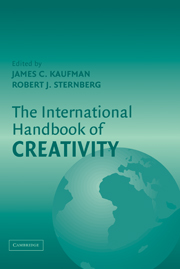Book contents
- Frontmatter
- Contents
- Acknowledgments
- List of Contributors
- 1 Introduction
- 2 Creativity Research in English-Speaking Countries
- 3 Creativity in Latin America
- 4 History of Creativity in Spain
- 5 Past, Present, and Future Perspectives on Creativity in France and French-Speaking Switzerland
- 6 Creativity in Italy
- 7 Creativity Research in German-Speaking Countries
- 8 Creativity Under the Northern Lights
- 9 Creativity in Soviet–Russian Psychology
- 10 Creativity Studies in Poland
- 11 Research on Creativity in Israel
- 12 Creativity in Turkey and Turkish-Speaking Countries
- 13 Development of Creativity Research in Chinese Societies
- 14 Creativity – A Sudden Rising Star in Korea
- 15 Culture and Facets of Creativity
- 16 African Perspectives on Creativity
- 17 Creativity Around the World in 80 Ways … but with One Destination
- Author Index
- Subject Index
17 - Creativity Around the World in 80 Ways … but with One Destination
Published online by Cambridge University Press: 05 June 2012
- Frontmatter
- Contents
- Acknowledgments
- List of Contributors
- 1 Introduction
- 2 Creativity Research in English-Speaking Countries
- 3 Creativity in Latin America
- 4 History of Creativity in Spain
- 5 Past, Present, and Future Perspectives on Creativity in France and French-Speaking Switzerland
- 6 Creativity in Italy
- 7 Creativity Research in German-Speaking Countries
- 8 Creativity Under the Northern Lights
- 9 Creativity in Soviet–Russian Psychology
- 10 Creativity Studies in Poland
- 11 Research on Creativity in Israel
- 12 Creativity in Turkey and Turkish-Speaking Countries
- 13 Development of Creativity Research in Chinese Societies
- 14 Creativity – A Sudden Rising Star in Korea
- 15 Culture and Facets of Creativity
- 16 African Perspectives on Creativity
- 17 Creativity Around the World in 80 Ways … but with One Destination
- Author Index
- Subject Index
Summary
To a very large degree, creativity made the world we live in. Remove everything about us that was not the product of the creative mind, and we would find ourselves naked in some primeval forest. Moreover, each culture and civilization on this planet is defined by the accumulation of creative products generated by the humans that have occupied this globe. Indeed, each society is distinguished from all others by the unique nature of its accumulation. For example, if we want to describe how Chinese civilization differs from all others, we have no other recourse but to make some reference to the philosophers, poets, painters, artisans, and other creators who left their unique mark on its cultural, aesthetic, and intellectual legacy. Given the universality of human creativity, it should come as no surprise that creativity attracts universal interest. Moreover, in nations having strong scientific traditions, this interest almost invariably inspires research on creativity as a phenomenon. That consequence is reflected in the preceding chapters of this book. At the same time, because each national tradition is a distinct cultural creation, this research is by no means homogeneous. On the contrary, the research carried out in each part of the world to some extent reflects the special needs, values, and concerns of a given heritage. This is also apparent in the earlier chapters. To some degree, there are as many ways of studying creativity as there are cultural traditions, perhaps as many as there are independent nations.
- Type
- Chapter
- Information
- The International Handbook of Creativity , pp. 490 - 496Publisher: Cambridge University PressPrint publication year: 2006
- 6
- Cited by



